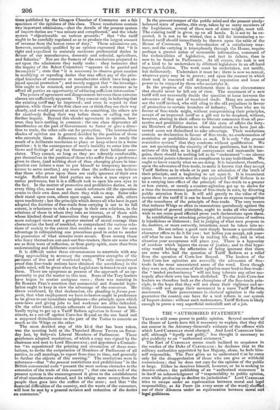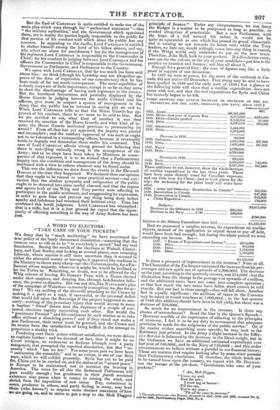THE "AUTHORIZED STATEMENT."
THERE is still some power in public opinion. Several members of the House of Lords have felt it necessary to explain that they did not concur in the Attorney-General's estimate of the offence with which Lord CARDIGAN stood charged. And Lord CARDIGAN him- self, although " legally not guilty," has thought it necessary to give publicity to an " authorized statement." The Earl of CARDIGAN seems much inclined to acquiesce in the verdict of the Duke of CLEVELAND : he declares that to the military authorities appointed by her Majesty, alone, he feels him- self responsible. The Peer gives us to understand that he cares only for the disapprobation of those who can give or withhold commissions ; that he does not care for the opinion of the public at large. Either he deceives himself, however, or he is seeking to deceive others : the publishing of an " authorized statement " is in itself an acknowledgment of "responsibility to public opinion,. even while professing to decline its jurisdiction." Lord Cam:nova' tries to escape under an equivocation between moral and legal responsibility, as his Peers (in every sense of the word) shufficd out of their dilemma under an equivocation between moral and legal guiltiness.
But the Earl of CARDIGAN is quite entitled to make use of the main plea which runs through his " authorized statement "—that " the military authorities," and the Government which appointed them, are in reality the parties legally responsible to the public for that portion of his conduct with which alone the public has any concern. In appealing to the duello, Lord CARDIGAN is entitled to shelter himself among the herd of his fellow sinners, and say, why select me alone for punishment ? but for the management of his regiment Lord CARDIGAN is responsible to the Commander in Chief; for his conduct in judging between Lord CARDIGAN and his officers the Commander in Chief is responsible to the Government, Government to Parliament, and Parliament to the Country.
We agree with Lord CARDIGAN, that far too much has been said about him : we think (though his Lordship may not altogether ap- prove of the form of expression of our concurrence) that he has been made of far too much consequence. The mess-squabbles of a dandy corps are of little importance, except in so far as they serve to show the disadvantage of having such regiments in the service. But the barefaced favouritism and partiality displayed by the Horse Guards in judging between the noble Colonel and his officers, give room to suspect a system of management in the Army that the public has an interest in seeing put an end to. When Lord CARDIGAN tells us that the Horse Guards has ap- proved of his conduct, there is no more to be said to him. But we are entitled to ask, what kind of conduct it was that received the sanction of the Horse Guards, and what kind of in- quiry the Horse Guards instituted previous to pronouncing its award ? From all that has yet appeared, the inquiry was partial and incomplete ; and the conduct approved of was such as ought not to be tolerated in a commanding-officer, because it necessarily tends to degrade and demoralize those under his command. The case of Lord CARDIGAN affords strong ground for believing that there is somr:bing radically wrong in the management of the Army; and as no steps have been taken by Ministers in conse- quence of that exposure, it is to be wished that a Parliamentary inquiry into the condition and management of the Army should be instituted with a view to reform whatever may be found amiss.
This was the inference we drew from the events in the Eleventh Hussars at the time they happened. We declared then our opinion that they ought to be turned to some practical account—our con- viction that the aimless sympathy and indignation of the public ought to be directed into some useful channel, and that the organs and agents both of the Whig and Tory parties were affecting to participate in the public sentiment, and exaggerating its expression, in order to gain time and prevent any thing being done before apathy and indolence had resumed their habitual away. Time has confirmed this harsh judgment. Lord CARDIGAN has triumphed : that is a trifle, but it is a just ground for regret that the oppor- tunity of effecting something in the way of Army Reform has been lost.



























 Previous page
Previous page